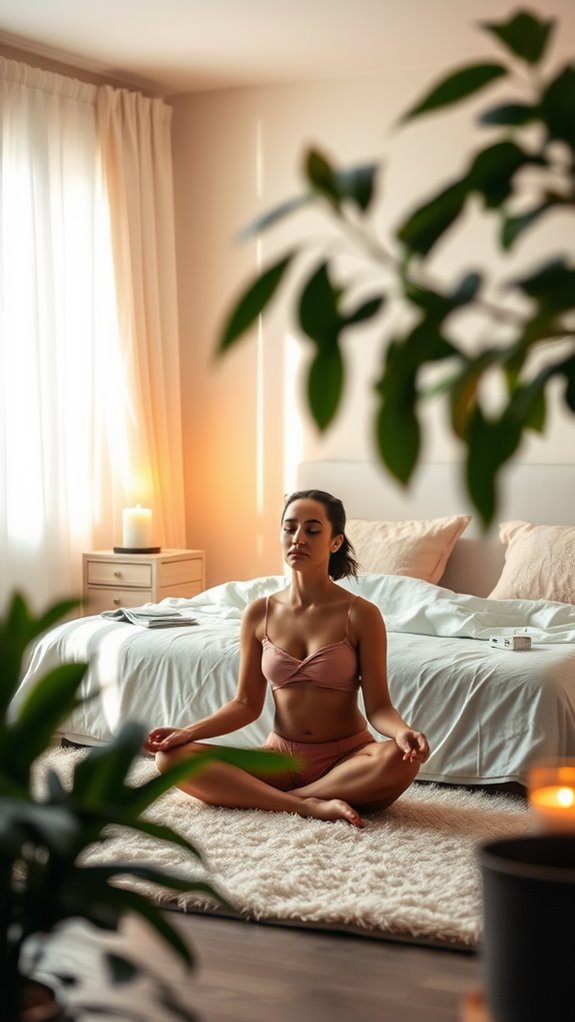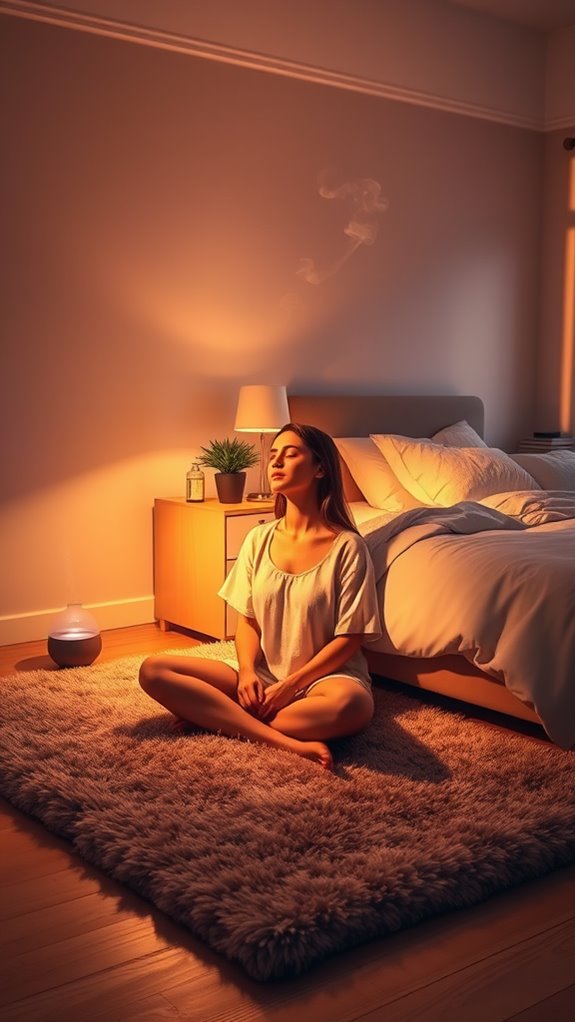Is It Good To Meditate Before Bed? Benefits & Best Tips
Last night, I found myself in the familiar battle with insomnia – phone in hand, scrolling endlessly through social media at 2 AM while my mind raced through tomorrow’s to-do list. As a sleep researcher who’s spent years studying bedtime habits, you’d think I’d know better. That’s when I remembered the simple meditation technique that changed everything for me. Five minutes of focused breathing, and suddenly those anxious thoughts about tomorrow’s presentation started melting away. The irony isn’t lost on me – I’d spent months testing everything from weighted blankets to white noise machines, when one of the most effective sleep solutions was literally just learning to sit still and breathe. Now, as someone who’s both studied and struggled with sleep, I can tell you why meditation before bed might be the nighttime game-changer you’ve been searching for.
Is It Good To Meditate Before Bed?

Yes, meditating before bed is beneficial as it can help you fall asleep twice as quickly and improve overall sleep quality.
Research indicates that 60% of individuals in insomnia trials no longer met the criteria for insomnia after regular meditation.
Techniques like mindfulness and guided meditation can alleviate insomnia symptoms, but if sleep issues persist, it’s important to consult a doctor. Additionally, meditation can enhance cognitive function by promoting relaxation and reducing stress, which are essential for a good night’s sleep.
Best Types of Meditation for Sleep

When it comes to winding down for the night, I’ve found a few types of meditation that really do the trick.
Imagine gently guiding your mind away from the chaos of the day with mindfulness meditation or letting a soothing voice lead you through a guided session—it’s like having a sleep coach right in your bedroom!
Body scan meditation and breathing exercises are my secret weapons for releasing tension, and trust me, they can turn your bed into a cozy cloud of relaxation. Regularly practicing non-sleep deep rest techniques can enhance your overall well-being, making it easier to drift off into a peaceful slumber.
Guided meditation
Guided meditation is an excellent choice for bedtime relaxation.
By listening to a pre-recorded session, you can easily focus on breathing exercises and visualization techniques that calm your mind and ease racing thoughts.
Many people find that using meditation apps enhances their nighttime routine, leading to improved sleep quality and reduced insomnia symptoms.
It’s a simple way to unwind and prepare your body for a restful night.
Mindfulness meditation
Mindfulness meditation is one of the best types of meditation for sleep.
By focusing on the present and observing your thoughts without judgment, it helps calm racing thoughts that disrupt sleep. This practice promotes relaxation, lowers stress, and can significantly improve sleep quality.
Incorporating it into your nightly routine can enhance overall sleep hygiene, making it easier to drift off peacefully.
Body scan meditation
Body scan meditation is a powerful technique for winding down before sleep.
By focusing on different body parts, you can release physical tension and recognize stress, promoting relaxation.
This method not only calms racing thoughts but also helps improve sleep quality and reduce insomnia symptoms.
Incorporating it into your nightly routine can make a significant difference in your ability to drift off peacefully. Additionally, practicing meditation can help regulate your sleep patterns, leading to more restorative rest each night.
Breathing exercises
Breathing exercises are a powerful tool for improving sleep quality.
By focusing on slow, deep breaths, you activate your body’s relaxation response, reducing heart rate and calming your mind.
Techniques like breath counting help anchor your attention and quiet racing thoughts.
Just 3 to 5 minutes of these exercises before bed can significantly ease insomnia and help you fall asleep faster.
Incorporating these techniques into your routine can complement good sleep hygiene practices for a more restful night!
How Long Should You Meditate Before Sleep?

Ever wonder just how long you should be sitting in silence before you hit the hay?
I started with a mere 3 to 5 minutes of meditation, and as I got comfy, I gradually bumped it up to 15 to 20 minutes.
Turns out, this nightly routine can significantly improve sleep quality and lead to that coveted deep sleep we all crave!
Tips for Effective Bedtime Meditation

When the day winds down and your mind starts to race like a hamster on a wheel, it’s time to hit the brakes with some effective bedtime meditation.
To help calm your mind, set aside 3 to 5 minutes and gradually increase to 15.
Focus on each part of your body, explore different meditation practices, and enjoy quality sleep with regular meditation.
Who Should Avoid Meditating Before Bed?

While many of us seek tranquility before bed, not everyone will find peace through evening meditation.
If you experience:
- Anxiety or racing thoughts
- Insomnia or sleep disturbances
- Restlessness or heightened alertness
It might be time to reevaluate.
Meditating too close to bedtime can turn relaxation into a mental marathon, leaving you wide awake when you should be drifting off.
Frequently Asked Questions
Is It Okay to Meditate Right Before Bed?
I’ve found that meditating right before bed can be really beneficial. It helps me relax and clear my mind, making it easier to drift off. I suggest trying it to see how it works for you.
Is It Good to Do Meditation at Night?
I find meditating at night really beneficial. It helps me unwind and clear my mind after a long day. Plus, it sets a peaceful tone for sleep, improving my overall rest and relaxation.
Is It Better to Meditate in the Morning or Night?
I’ve found that meditating in the morning boosts my focus for the day, while nighttime sessions help me unwind. It really depends on what I need at the moment—both times have their unique benefits.
Is It Okay to Sleep After Meditation?
I’ve found it’s perfectly okay to sleep after meditation. It often helps me unwind and settles my mind. Just be mindful to stay present during the practice, so I don’t drift off too early.
In Conclusion
Meditating before bed offers a gentle way to transition into sleep. The practice can help calm racing thoughts and create better sleep quality for many people.
While meditation works well for most individuals seeking improved rest, those with anxiety may need to explore different relaxation methods. Start with short sessions of 5-10 minutes and adjust the timing based on your personal response.
Try incorporating a simple bedtime meditation routine tonight. Focus on steady breathing, let go of daily stress, and allow yourself to prepare naturally for sleep. If you need guidance, many apps and online resources provide bedtime meditation exercises.
